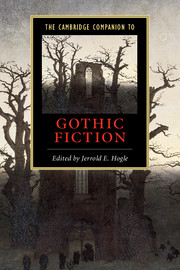Book contents
- Frontmatter
- 1 Introduction
- 2 The genesis of “Gothic” fiction
- 3 The 1790s
- 4 French and German Gothic
- 5 Gothic fictions and Romantic writing in Britain
- 6 Scottish and Irish Gothic
- 7 English Gothic theatre
- 8 The Victorian Gothic in English novels and stories, 1830-1880
- 9 The rise of American Gothic
- 10 British Gothic fiction, 1885-1930
- 11 The Gothic on screen
- 12 Colonial and postcolonial Gothic
- 13 The contemporary Gothic
- 14 Aftergothic
- Guide to further reading
- Filmography
- Index
- Series list
7 - English Gothic theatre
Published online by Cambridge University Press: 28 May 2006
- Frontmatter
- 1 Introduction
- 2 The genesis of “Gothic” fiction
- 3 The 1790s
- 4 French and German Gothic
- 5 Gothic fictions and Romantic writing in Britain
- 6 Scottish and Irish Gothic
- 7 English Gothic theatre
- 8 The Victorian Gothic in English novels and stories, 1830-1880
- 9 The rise of American Gothic
- 10 British Gothic fiction, 1885-1930
- 11 The Gothic on screen
- 12 Colonial and postcolonial Gothic
- 13 The contemporary Gothic
- 14 Aftergothic
- Guide to further reading
- Filmography
- Index
- Series list
Summary
According to Northrop Frye, “There has never … been any period of Gothic English literature, but the list of Gothic revivalists stretches completely across its entire history, from the Beowulf poet to writers of our own day.” There was, however, a specific period of Gothic English drama. While scholars have identified Gothic elements throughout the dramatic tradition from Euripides and Seneca to Tennessee Williams and The Rocky Horror Picture Show, it is important to locate the Gothic drama proper in the late eighteenth and early nineteenth century (that is, during the period we call “Romantic”),when it rose and fell as a major force on the London stage. During an era when English audiences anxiously lived through a series of political, economic, social, cultural, and literary innovations the Gothic drama provided a major new form of entertainment and of reflection upon a world in major upheaval.
Still, Frye’s point that the Gothic has always seemed belated, always a revival rather than an origin, does apply to the Gothic on stage. Gothic drama arose in England roughly between 1789 and 1832 under a multiple debt of imitation. As Gothic drama, it appeared after and often as an imitation of Gothic novels. As Gothic drama, it struck many as an attempt to revive the conventions and motifs of great Elizabethan and Jacobean plays, or alternatively as a dangerous effort to import the suspect German drama of the Sturm und Drang, a deliberate theatrical style of anticlassical “Storm and Stress” that began with a German play of that name by F. M. Klinger in the 1770s (Mulvey-Roberts, Handbook to Gothic Literature, p. 286). While wildly popular then (as is now its descendent, the horror movie), the Gothic drama has always been found by critics to be second-hand literature: second-rate as literature and secondary to an understanding of the Gothic firmly grounded in the novel. What we need is an account of Gothic drama on its own terms.
- Type
- Chapter
- Information
- The Cambridge Companion to Gothic Fiction , pp. 125 - 144Publisher: Cambridge University PressPrint publication year: 2002
- 4
- Cited by



